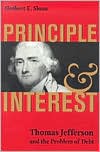

 |

|

The average rating for Principle and Interest: Thomas Jefferson and the Problem of Debt based on 2 reviews is 2.5 stars.
Review # 1 was written on 2011-03-13 00:00:00 Nick Mckenzie Nick MckenzieGreat insight into a not so often discussed character flaw of Thomas Jefferson. |
Review # 2 was written on 2013-06-15 00:00:00 Damon Pace Damon PaceGeorge Washington And The Shaping Of The American Presidency George Washington has a deservedly iconic, larger than life, stature among Americans; and yet his own reserve and aloofness, combined with the 18th Century world in which he lived, make him difficult for most Americans today to understand. With President's Day approaching and our country in the midst of a presidential election, I wanted to revisit Washington. This biography by James MacGregor Burns and Susan Dunn, part of the "American Presidents" series, tells a great deal in short compass about Washington and why he remains important. The study avoids the tendency to place Washington upon a pedestal, and it also avoids the more modern, and much more regrettable, tendency to deflate. Washington (1732 --1799) was born to the landed aristocracy of Virginia. He served in the French and Indian Wars (1754 -- 1758), as a delegate to the first Continental Congress, as the Commander in Chief during the American Revolution (1775- -- 1781) and as the president of the Constitutional Convention in Philadelphia (1787), among other accomplishments, before becoming the first President of the United States (1789 --1796). In the early chapters of this book, Burns and Dunn trace the character traits of Washington that fitted him for leadership, together with some of his flaws. They paint a portrait of a Washington driven by ambition and concern for his reputation, but also a person of character, intelligence, and sound judgment. More than once in his life, Washington professed himself reluctant, notwithstanding his ambition, to assume or to expand upon powers he readily could have assumed. Washington did indeed temper his ambition and drive with restraint. The central theme of this book is how Washington proceeded to set the tone of the American Presidency. The authors draw a number of valuable distinctions. The first is between the ceremonial function of the American President -- as representative of the American people and above the political fray -- and the President's political function. As a result of the respect in which he was held, Washington unified the United States under his leadership and, as the authors state, enhanced the position of the Presidency by his occupation of it rather than, as with his successors, having his own reputation enhanced by virtue of becoming the President. This was an invaluable accomplishment to perform for the new nation. The authors further distinguish between Washington as a transactional and as a transformational leader. As a transactional leader, Washington acted as an administrator in supervising the complex business of government, including the relationship of the Executive Branch with Congress and with foreign countries. As a transformational leader, Washington acted to create a strong presidency, within the limits established by the constitution, "as well as inspiring and cementing citizens' commitment to the federal government." The authors also two main commitments underlying Washington's presidency: a commitment to reason, compromise, and judgment, as developed in the philosophy of the Enlightenment, and a commitment to happiness as the end of government. Washington did not view happiness as synonymous with pleasure but rather as involving a well-ordered republic with laws that applied fairly and equally to everyone and which allowed everyone the opportunity to improve themselves and to flourish. The book examines Washington's relationships with his brilliant colleagues, Hamilton, Jefferson, and James Madison and how, at his best, he listened to their frequently divergent views before deciding himself on a wise course of action. Washington's toleration and slowness to judgment receive deserved praise in this study. The authors also examine some of the less fortunate aspects of the Washington presidency, including its elitism, lack of understanding of those other than the rich and powerful, and its obsession with order and discipline. These factors, among others, would lead even in Washington's lifetime to the development of the party system that Washington had hoped to avoid. The authors also are critical of Washington's failure to publicly address the issue of slavery and to his all too frequently demonstrated acquisitiveness and tendency to drive sharp bargains in his private life. In our complicated, difficult political world, this book will remind the reader of the origins of our system of government. It will encourage reflection on the nature of leadership, both when it fails and when it is brilliantly executed, as it was during the presidency of George Washington. Robin Friedman |
CAN'T FIND WHAT YOU'RE LOOKING FOR? CLICK HERE!!!